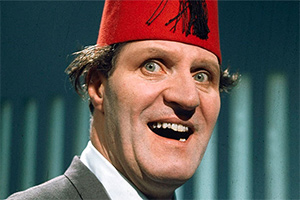
Tommy Cooper
- Welsh
- Comedian and magician
Press clippings Page 12
Comedian Tommy Cooper was regularly credited with the ability to be funny without actually having to do anything. At 6'4!, with messy hair and a red fez on his head, he certainly looked the part. Using previously unseen footage, plus details from the diaries of Cooper's manager Miff Ferrie, this documentary provides a portrait of the troubled comedy giant, who died in 1984. Contributions come from Johnny Vegas and Damien Hirst.
Terry Ramsey, The Telegraph, 23rd December 2011Russ Abbot interview: toasting the magic Tommy Cooper
Russ Abbot tells Michael Deacon about playing the irrepressible comic Tommy Cooper for new Radio 3 drama, Glass Chair Chair Glass.
Michael Deacon, The Telegraph, 16th September 2011Coming up: Glass Chair Chair Glass
This Sunday on Radio 3, Russ Abbot stars in a play that imagines a day when Tommy Cooper met absurdist playwright Eugene Ionesco.
Jon Aird, BBC Comedy, 14th September 2011Glass Chair Chair Glass
This Sunday on Radio 3, Russ Abbot stars in a play that imagines a day when Tommy Cooper met absurdist playwright Eugene Ionesco. Writer Annie Caulfield tells us how this came about...
Annie Caulfield, BBC Comedy, 14th September 2011Channel 4 prepares new Tommy Cooper documentary
Channel 4 has announced detail of an upcoming documentary about comedy magician Tommy Cooper.
British Comedy Guide, 13th September 2011Russ Abbot to play Tommy Cooper in new BBC radio drama
Russ Abbot is to play Tommy Cooper in a BBC drama that imagines what would have happened if the comedian and magician had met absurdist playwright Eugene Ionesco.
Matthew Hemley, The Stage, 25th August 2011Ian D Montfort is a Derren Brown-Tommy Cooper hybrid
Writer, actor and stand-up comedian Tom Binns mixes Tommy Cooper and Derren Brown in his new Edinburgh Fringe show.
STV, 19th August 2011Watching this series's parade of classic comedy clips, chosen by comedians of today, confirms the theory that some people just have funny bones. It wouldn't matter if Tommy Cooper were clipping his toenails or performing the elaborately shambolic glass bottle trick from 1974 that is replayed here tonight: the fez-wearing comedian induces guffaws just because of who he is. Similarly, Peter Cook and Dudley Moore go wildly off-script in their "Pete and Dud" sketch in the art gallery and start giggling, but they're naturally funny together, as Phill Jupitus and Rhod Gilbert attest here. Funny comes in many packages, and while the American stand-up Joan Rivers, chosen by Graham Norton and Jo Brand as a favourite, is well-known for her shock tactics, her outrageous quips about growing old on The Graham Norton Show appeared to take even Norton aback at the time. Other treats featured are the University Challenge scene from The Young Ones in 1984, co-starring Hugh Laurie and Stephen Fry, and the bit in the Monty Python film Life of Brian in which Graham Chapman's Brian Cohen exhorts his followers to think for themselves. It may be a clip show and most of the clips are more than familiar, but it surely contains more laughs per minute than any of the newer comedies on television tonight.
Vicki Power, The Telegraph, 4th August 2011Who could forget Mandy, the peroxide blonde bombshell with the catchphrase "Ooh, you are awful but I like you"? During the sixties and seventies, it must have been quoted at parties, pageants and playgrounds up and down the land as often as Vicky Pollard's "Yeah but, no but" or Victor Meldrew's "I don't believe it" decades later.
Yet Mandy's creator, Dick Emery, seems to have been largely erased from the nation's comedy memory bank. Unlike Tommy Cooper, Morecambe and Wise and the Two Ronnies, whose work is deservedly kept alive by repeats on Gold as well as the terrestrial channels, the brilliant Emery has been curiously absent from our screens since his death 30 years ago.
None of the contributors to Dick Emery - A Comedy of Errors could account for this glaring oversight, including presenter David Walliams, clearly a big fan in his youth. The best they could come up with was that Emery's success predated the marketing boom of the eighties when artists like Cooper and Morecambe and Wise were immortalised on T-shirts, mugs, greetings cards and the like.
While the documentary was a fitting tribute to an outstanding comedy talent, it also revealed the troubled man behind the many funny faces. Nervous, insecure and incapable of fidelity, Emery's early childhood had been spent on tour with his parents, a variety double act, not the most stable of upbringings.
His love life - five failed marriages, umpteen love affairs - reflected a restlessness and terror of being alone. One of his children, Eliza, now a singer-songwriter, said he sought constant reassurance that she loved him, even though it was probably his kids who needed assuring the most.
Walliams concluded in characteristic Emery style, "What we need is more Dick on our screens," followed rather predictably by a rousing "Ooh, you are awful but I like you".
Nick Smurthwaite, The Stage, 1st April 2011First shown on BBC Four, the second half of Michael Grade's history of the variety era examines what happened to the entertainers once the theatres closed and TV cameras beckoned. He talks to stars who managed to make the transition from stage to screen, among them Bruce Forsyth, Des O'Connor and Ken Dodd. Grade also looks at Sunday Night at the London Palladium, plus the impact of Tommy Cooper and Morecambe & Wise.
Michael Hogan, The Telegraph, 25th March 2011